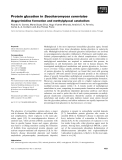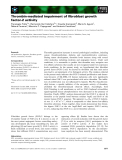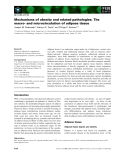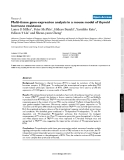
Diabetes and cancer.
-
Methylglyoxal is the most important intracellular glycation agent, formed nonenzymatically from triose phosphates during glycolysis in eukaryotic cells. Methylglyoxal-derived advanced glycation end-products are involved in neurodegenerative disorders (Alzheimer’s, Parkinson’s and familial amy-loidotic polyneurophathy) and in the clinical complications of diabetes.
 11p
11p  fptmusic
fptmusic
 12-04-2013
12-04-2013
 44
44
 2
2
 Download
Download
-
Thrombin generation increases in several pathological conditions, including cancer, thromboembolism, diabetes and myeloproliferative syndromes. During tumor development, thrombin levels increase along with several other molecules, including cytokines and angiogenic factors. Under such conditions, it is reasonable to predict that thrombin may recognize new low-affinity substrates that usually are not recognized under low-expression levels conditions.
 13p
13p  viettel02
viettel02
 22-02-2013
22-02-2013
 36
36
 3
3
 Download
Download
-
Adipose tissue is an endocrine organ made up of adipocytes, various stro-mal cells, resident and infiltrating immune cells, and an extensive endo-thelial network. Adipose secretory products, collectively referred to as adipokines, have been identified as contributors to the negative conse-quences of adipose tissue expansion that include cardiovascular disease, diabetes and cancer.
 9p
9p  viettel02
viettel02
 20-02-2013
20-02-2013
 43
43
 5
5
 Download
Download
-
Genome Institute of Singapore, Agency for Science, Technology and Research, 60 Biopolis Street, Singapore, 138672. †National Institute of Diabetes and Digestive and Kidney Diseases, National Institutes of Health, Bethesda, MD 20892, USA. ‡Laboratory of Molecular Biology, National Cancer Institute, Bethesda, MD 20892-4264, USA. Correspondence: Sheue-yann Cheng. E-mail: sycheng@helix.nih.gov
 0p
0p  thulanh21
thulanh21
 15-11-2011
15-11-2011
 49
49
 2
2
 Download
Download
CHỦ ĐỀ BẠN MUỐN TÌM

















